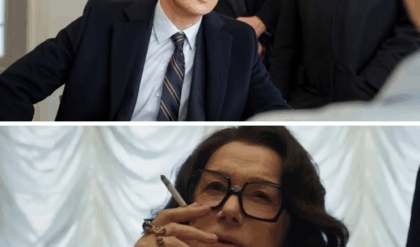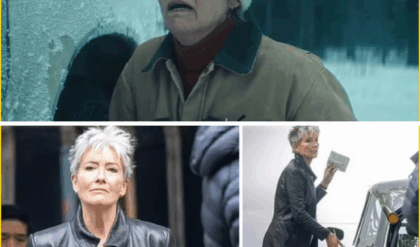There is an obvious danger in trying to suss out the success or failure of a season of television that has only reached the midway point. Not only are arcs halfway developed, but things we assume to be true often turn out to be something wholly different.
When I initially sat down to write up my assessment of The Walking Dead’s sixth season thus far, I was not nearly as frustrated with the show as some critics. With three near perfect episodes opening the season and a brilliantly plotted, and even more bravely timed, peek into Morgan’s backstory, my criticisms of the show had been largely confined to pacing issues. And then the fight scene between Carol and Morgan aired.

What has long fascinated me about The Walking Dead, and especially showrunner Scott M. Gimple’s clearly articulated vision for the show, is the way the narrative often operates on two levels. There is what is happening in the moment (Carol seeing Sophia emerge from the barn) and then there is the story that unfolds when we pull back and consider the events within the context of the larger narrative (the impact of Carol losing another child in her care). For better or worse, both of those perspectives came into play the moment Morgan rendered Carol unconscious.
Let’s be clear from the outset. Morgan did not just punch Carol in the heat of battle. He body-slammed her into concrete.

From a story perspective, Morgan coldcocking Carol makes sense in that he only knows her as a warrior who will stop at nothing to protect her family. Having seen her fighting prowess and unrelenting commitment to exterminating all danger, even human, Morgan views Carol as a deadly equal. When he hits her, it is not out of anger but out of desperation as he tries to stave off what he sees to be the greater evil, the death of the Wolf. His striking her exists in a vacuum of sorts in which his sole focus is preventing what he deems to be an immoral killing.
And here is where Gimple’s commitment to provocative storytelling becomes problematic. The audience does not exist in the same vacuum as Morgan. We know Carol’s history as a domestic abuse survivor and so seeing her knocked senseless by a man, especially one who espouses pacifism, goes beyond unsettling. It is traumatizing, especially as Carol has become a hero for many real life domestic abuse survivors. Yes, the scene may (and in fact I believe will) serve a broader arc in which Carol is finally given space with which to deal with the emotional fallout of her actions after Sophia’s death. But the visual of her being slammed into concrete and left in an unconscious heap is one that resonates beyond the story being told on screen.

So where, if at all, does Gimple’s responsibility to the audience come into play? The story that he has been telling over the past three seasons as showrunner is one that is largely responsible for shifting some of the show’s focus on to Carol Peletier, one of television’s most complex and well-developed characters. Without him at the helm, I’m not sure Carol would have been allowed to evolve. And while many can, and have, argued whether that evolution is positive, it has provided viewers with a wholly original character who is cunning, deadly, capable and always motivated by a desire to protect those she loves. That we are talking about a female character who encompasses these qualities is all the more stunning.
Horror is supposed to be confrontational and it is supposed to make us uncomfortable. From that standpoint, the scene reads as a success. But since many viewers respond so strongly to Carol because they identify with her abusive background, shouldn’t Gimple have avoided the visual of her lying unconscious at the hands of a man, especially one we know to have gone through his own anger issues?
 We know that Morgan has done all he can to avoid physical confrontations, but his default in tonight’s scene was to meet violence with violence. His Aikido training, which advocates meeting an opponent with restraint instead of violence, seemingly went out the window. It was an important moment for the character, but I can’t help but think it could have been accomplished in a less triggering way. I’m not suggesting that Carol needs to be handled with kid gloves but maybe the audience does.
We know that Morgan has done all he can to avoid physical confrontations, but his default in tonight’s scene was to meet violence with violence. His Aikido training, which advocates meeting an opponent with restraint instead of violence, seemingly went out the window. It was an important moment for the character, but I can’t help but think it could have been accomplished in a less triggering way. I’m not suggesting that Carol needs to be handled with kid gloves but maybe the audience does.
The problematic nature of Morgan’s rendering Carol unconscious comes not from the story’s construction but in its reception. Thanks to online spoiler sites, fans knew in advance that a physical altercation between these two characters was coming. Fan responses ranged from glee that Carol would finally be on the receiving end of some punishment for all her supposed sins to outrage that the series would show a domestic abuse survivor being physically assaulted on screen. And while I find the former response clearly more troubling for a host of reasons, both views were based on conjecture and without full knowledge of how the scene would unfold.
And now that the scene in question has aired? The response is even more disturbing. Meme after meme appeared in which Morgan and Carol were cast as WWE wrestlers, played for humor. Such is the Internet, I suppose, but when put up against devastated tweets by abuse survivors, a profound ethical dilemma emerges: should showrunners anticipate the reaction of their viewers when they decide how scenes play out on screen?

Complicating the issue is the absolute artistic brilliance of the scene. Melissa McBride and Lennie James secured their positions as the show’s best actors with McBride especially delivering a breathtakingly nuanced performance. The scene was well-crafted, expertly acted, and rich in dialogue. The Walking Dead should be a show that horrifies us but does that obligation come with a caveat? As I continue to process this scene, I’m still not sure.
The mid-season finale certainly offered some fairly heady philosophical quandaries. Will Morgan’s ignorance of Carol’s history as a domestic abuse survivor make his hitting her any more palatable to the audience? Did the fact that the escaped Wolf didn’t kill anyone as he fled vindicate Morgan’s pacifism? Is there room for both Carol’s and Morgan’s philosophies to co-exist? Even those railing against the events of this season (Glenn’s fake-out death, Rick and Jessie’s questionable romantic entanglement, the usefulness of the Alexandrians in the show’s overall story) must admit that these are all worthy questions for debate and speak volumes about the multilayered storytelling taking place.





